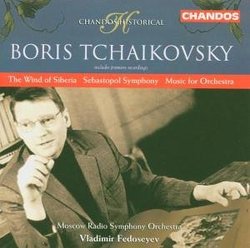| All Artists: Boris Tchaikovsky, Vladimir Fedoseyev, Moscow Radio & Television Symphony Orchestra Title: Boris Tchaikovsky: The Wind of Siberia; Sebastopol Symphony; Music for Orchestra Members Wishing: 0 Total Copies: 0 Label: Chandos Release Date: 4/26/2005 Genre: Classical Styles: Historical Periods, Modern, 20th, & 21st Century, Symphonies Number of Discs: 1 SwapaCD Credits: 1 UPC: 095115129920 |
Search - Boris Tchaikovsky, Vladimir Fedoseyev, Moscow Radio & Television Symphony Orchestra :: Boris Tchaikovsky: The Wind of Siberia; Sebastopol Symphony; Music for Orchestra
CD DetailsSimilar CDs
|
CD ReviewsVintage recordings revealing the art of a musical genius. A David A. Hollingsworth | Washington, DC USA | 11/02/2005 (5 out of 5 stars) "The very beginning of Boris Tchaikovsky's Sevastopol Symphony (sometimes spelled Sebastopol) of 1980 cries in anguish: the feeling portrayed by the high octaved woodwinds. But, soon thereafter, the mood becomes reflective (as though one's watching the leaves falling gently from the trees though not at all dismissing the beauty left in the world). And it is the harp that paints that beauty and tranquillity. Yet, it is short-lived, and the troubled aspects of the work are laid out mingled with the some affirmation of hope. It is not a typical `from darkness to light' composition and to pinpoint the emotionalism and the message behind the work is up to the listener. But, analyzing this astonishing yet a complex work goes deeper than calling it ambiguous. It goes through several episodes and structural changes and as the composer states (in reading Pyotr Klimov's well informative booklet essay) the symphony has no chronology. The first ten minutes of the score goes through stages as though Tchaikovky is crystallizing what he's trying the say. But at 10'55", matters become clearer when the brightness of the mood becomes darker. The material becomes conflictive and something in dies irae in proportion at the climax @14'26". Yet, there is hope and that beauty and at 19'01" the flute and the supporting muted strings paint them well. It is a deep passage, the one where introversion sets in with senses of nostalgia and longing. But the work fights on and the mood again brightens, only more reverberantly and once that's threatened by the cries of the woodwinds and high tremolo strings, the reflective yet subtle looking-forwardness of the symphony ends it. It is no doubt a monumental composition as far as substance is concerned. Tchaikovsky's Music for Orchestra (1987) is a continuous seven-movement piece and, like the Sebastopol Symphony, consists of contrasting episodes (the work is more like a suite in that regard). The Motive is curious because of its independence: it really does not paint the scope and the nature of the work as its title might suggest. But I really like the next movement `Far Road' with its inner-most cogitating self (reminds me of his symphonic poem Juvenile). There's something mockingly picturesque in `The Wires Sing' while the remaining four movements are appealingly characteristique in their own ways (especially the `Epilogue'). But turn to Tchaikovsky's "The Wind of Siberia" (1984) and you'll discover a masterpiece. The tone painting and orchestra are so stupendous that they would do Sir Arnold Bax proud (the author of among other great works, "Winter Legends"). I truly admire how he sets the stage of the symphonic poem, with the chilling tremolo of the strings that paints the region north and yet so distant and far removed from `civilization.' The composition is tripartite in structure with ensuing yet a very elaborate development section that paints the region to compelling results (and yet with some underlying warmth that makes the music not at all unfeeling). The tone painting and originality, however, remain awesome especially with the use of six kettledrums (@6'46"-ff). But the highlight of the work is how the coda culminates to an awesome climax beginning @13'19" before the piece ends with such a transcendental, almost angelic note. The piece (as do the others on this album) shows Boris Tchaikovsky at his most unrelentness in his creative spirits. And there's nothing short of admiration of how Vladimir Fedoseyev and his orchestra proceed in conveying the musical art of an underrated yet recently re-discovered genius. Fedoseyev, who've worked with Boris Tchaikovsky for many years, performed the works with upmost conviction and flair and the relishment of his Moscow Radio Symphony Orchestra (now named after Piotr Illych Tchaikovsky) is consistently excellent throughout their journey in bringing his music to the fore. Not only does Chandos deserves praise and gratitude for such an enterprising re-issue, but so does the Boris Tchaikovsky Society as well - the organization with a tireless mission to expose the music of an amazing creative mind to a wider audience. Admittedly, its work is far from over, but the efforts are paying off, as was the case of Eduard Tubin during the 1980s and beyond. The otherwise successful recording transfers of Chandos sound somewhat more distant and less impacting than the Melodiya originals. But the sounding is very good and clear nevertheless while the overall presentation is excellent and exemplary (and companies that re-issue recordings particularly of operas could and should learn from this example). It's an album that ought not to be missed, for what's about to be uncovered is likely to force you to ask yourself, what have I've been missing. Fans of Sir Arnold Bax could relate to that as can I." Profundo y melancolico Querandin Reccius | Granada, Spain | 05/04/2006 (5 out of 5 stars) "Desconocido para muchos, Boris Tchaikovsky constituye uno de los mejores representantes de la musica denominada "sovietica". Si bien las obras incluidas en este disco fueron compuestas en las postrimerias de la era sovietica (1980-1987), por formacion y espiritu Tchaikovsky es un producto de dicha era. Musica profunda, por momentos tragica, que sabe reflejar acertdamente los estados de animo que comunica. Especialmente notable es el poema sinfonico The Wind of Siberia. Fedoseyev maneja a la perfeccion los tempos y la Moscow Radio Symphony es un excelente complemento de precision y finura.
"Musica desconocida" que con el tiempo debiera ir adquiriendo un sitial entre los grandes compositores rusos del siglo XX." |


 Track Listings (9) - Disc #1
Track Listings (9) - Disc #1

